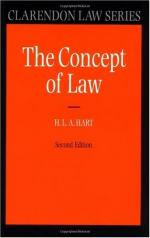
|
| Name: _________________________ | Period: ___________________ |
This test consists of 15 multiple choice questions and 5 short answer questions.
Multiple Choice Questions
1. What type of rules does international law lack?
(a) Rules of recognition.
(b) Primary rules.
(c) Enforcement rules.
(d) Rules of legislature.
2. What does International law threatens according to Chapter 10?
(a) The account of law previously developed.
(b) Smaller countries.
(c) National independence.
(d) Local judges.
3. What make the conduct obligatory?
(a) Some moral rules.
(b) Peer pressure.
(c) The law.
(d) Fear of repression.
4. What can judges statement be because of their external point of view?
(a) Long.
(b) Incomplete.
(c) Correct.
(d) Incorrect.
5. What does Hart say of legal positivism?
(a) It has no merits.
(b) It has some merits.
(c) It is the best option.
(d) It is better ignored.
6. What is deeply embedded within humanity?
(a) Selfishness.
(b) Morality.
(c) Hope.
(d) Principle of equality.
7. What can't interpretation of the authoritative quality of the general rules do?
(a) Create laws.
(b) Support Morale.
(c) Create Uncertainty.
(d) Force obedience.
8. How does Hart call a legal system when one group cease to do its parts?
(a) It is unfinished.
(b) It is lumpsided.
(c) It has pathology.
(d) It is unused.
9. What do some see morality as doing?
(a) Render laws unjust.
(b) Make people the enforcers.
(c) Ensure no resistance to the law.
(d) Render law just.
10. What does International law lack?
(a) Morale law.
(b) Legislature and compulsory jurisdiction.
(c) Custom laws.
(d) A common tribunal.
11. What are laws usually obeyed to?
(a) The letter.
(b) A degree.
(c) The spirit of the law.
(d) A fault.
12. What do people often equate to legal system?
(a) Justice system.
(b) Legal enforcement.
(c) Police.
(d) The judges.
13. How does Hart see international law until basic rules of recognition are formulated?
(a) As a transition system to secondary rules.
(b) As undetermined laws.
(c) As unbinding laws.
(d) As stepping stone toward a global law system.
14. When do moral rules and legal rules usually apply to people?
(a) Only in case of emergency.
(b) All the time.
(c) Half the time.
(d) One at a time.
15. What does Hart say of the determination of the conditions necessary to have a legal system?
(a) It is evidence based.
(b) It is impossible.
(c) It is easy.
(d) It is hard.
Short Answer Questions
1. What does Hart say is connected to the idea of justice?
2. What are subordinate to rules of recognition?
3. What happens when secondary rules are accepted, according to Chapter 6?
4. What do positivists tend to see natural laws?
5. What does Hart cite counterexamples of concerning international obligations?
|
This section contains 459 words (approx. 2 pages at 300 words per page) |

|




